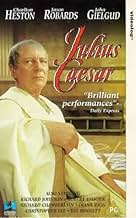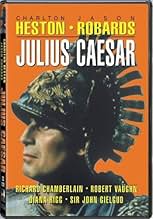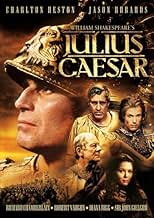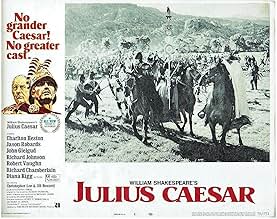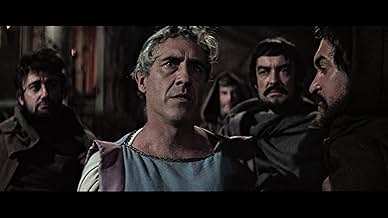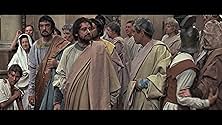Ajouter une intrigue dans votre langueThe growing ambition of Julius Caesar is a source of major concern to his close friend Brutus. Cassius persuades him to participate in his plot to assassinate Caesar, but they have both sore... Tout lireThe growing ambition of Julius Caesar is a source of major concern to his close friend Brutus. Cassius persuades him to participate in his plot to assassinate Caesar, but they have both sorely underestimated Mark Antony.The growing ambition of Julius Caesar is a source of major concern to his close friend Brutus. Cassius persuades him to participate in his plot to assassinate Caesar, but they have both sorely underestimated Mark Antony.
- Julius Caesar
- (as Sir John Gielgud)
Histoire
Le saviez-vous
- AnecdotesRobert Vaughn says in his memoirs that Jason Robards, Jr. was very unhappy during the filming period, and dubious about the end result.
- GaffesCassius drinks from a wooden cup during the riot scene. When he throws the wooden cup it makes a sound as if it was glass.
- Citations
Julius Caesar: Let me have men about me that are fat; Sleek-headed men, and such as sleep o' nights. Yond Cassius has a lean and hungry look; He thinks too much: such men are dangerous.
- ConnexionsFeatured in History Buffs: Rome Season Two (2017)
And then there's the political/historical tragedy that is JULIUS CAESAR.
The 1953 version, adapted for the screen and directed by Joseph Mankiewicz, was and still is considered one of the best of the Bard's adaptations ever to make it to the screen. And then in 1969, an enterprising and young Canadian producer named Peter Snell decided to mount a new adaptation of this work. The result was, by all accounts, one that arguably fell into the shadow of Mankiewicz's version, which after all had Marlon Brando as Marc Antony; Louis Calhern as Caesar; and Sir John Gielgud as Cassisus, one of the conspirators. Indeed, many consider this film wildly erratic for various reasons, including one quixotic bit of casting that didn't come off. Still, the play is the thing, as the old saying goes.
For this go-around at JULIUS CAESAR, the film is helmed by English director Stuart Burge, who did a yeoman adaptation of the Bard's OTHELLO in 1965, with Robert Furnival faithfully adapting the play to good effect. And you have, in the main, a great cast. Gielgud appears here in the title role, and he does a superlative job. Charlton Heston does a solid turn as Marc Antony (although in his journals he admits that's not such a big trick, since, in his view, if you can't do Marc Antony, you probably shouldn't be doing The Bard in the first place). The film also benefits from the turns given by Richard Chamberlain (as Octavius Caesar), Robert Vaughn (as Casca), Christopher Lee (as Artemidorus), Richard Johnson (as Cassius), Diana Rigg (as Portia), and Jill Bennett (as Calpurnia).
The thing, though, is that a lot of the focus of the play, and subsequently the film, is not so much on Caesar as much as it is on Marcus Brutus, the man torn between his allegiance to Caesar and a need to save the Roman Republic from Caesar's machinations. It takes a solid performance to pull it off really well; and if the actor doing Brutus isn't well versed in Shakespeare, the film will invariably suffer. This is what happens here, with Jason Robards having accepted a role he just wasn't cut out for, when the oft-elusive Orson Welles was unavailable.. What worked in the plays of Eugene O'Neill, and on screen in films like ALL THE PRESIDENT'S MEN, ONCE UPON A TIME IN THE WEST, THE BALLAD OF CABLE HOGUE, and MAGNOLIA doesn't really work well here. He is simply a great actor in a great role, but it was not one that he could have ever showed his best at—though over the course of the film, he does improve.
That having been said, the stellar performances of Heston, Gielgud, Vaughn, and the others make up for Robards' inadequacies; and Burge's direction, while not really on a par with Welles, Olivier, or Zefirelli, is solid enough. Clearly, this isn't the most successful adaptation of The Bard. But given how hard it is to pull Shakespeare off cinematically, it is worth a 7 (out of 10).
Meilleurs choix
- How long is Julius Caesar?Alimenté par Alexa
Détails
- Date de sortie
- Pays d’origine
- Site officiel
- Langue
- Aussi connu sous le nom de
- Julius Caesar
- Lieux de tournage
- Société de production
- Voir plus de crédits d'entreprise sur IMDbPro
- Durée1 heure 57 minutes
- Mixage
- Rapport de forme
- 2.35 : 1
Contribuer à cette page


